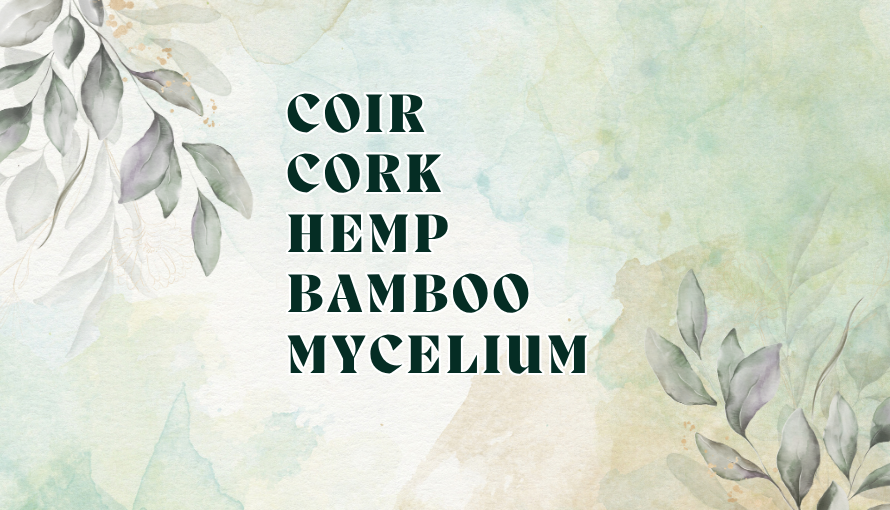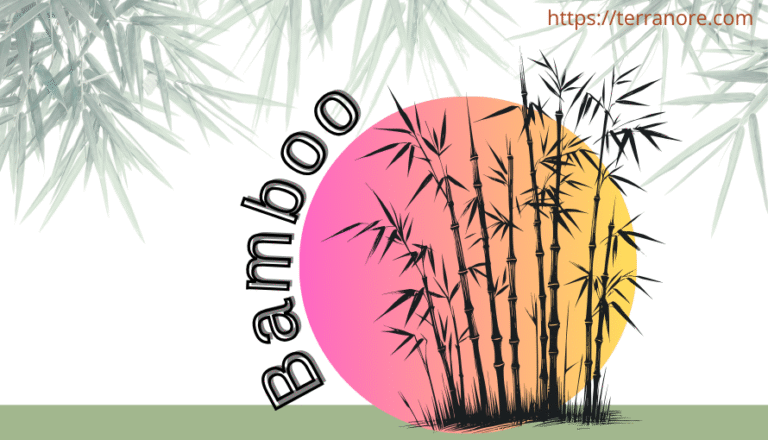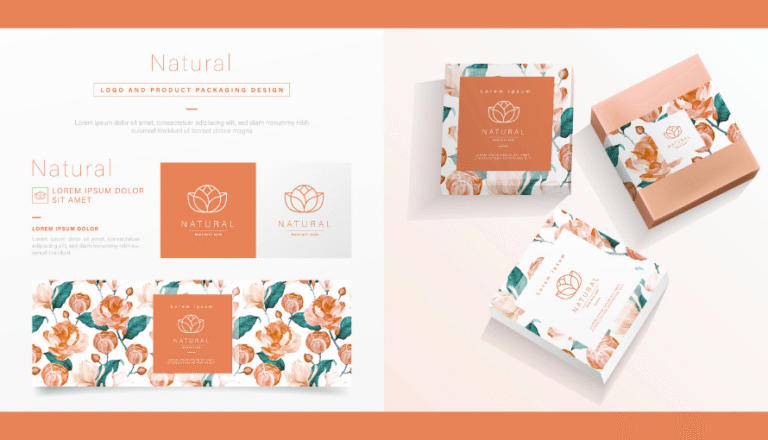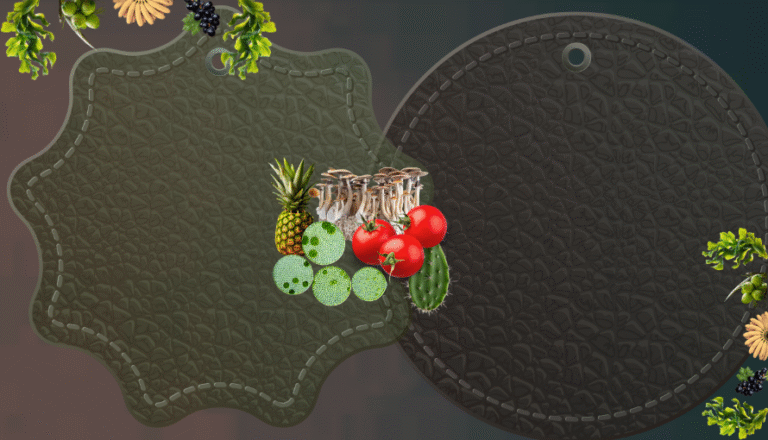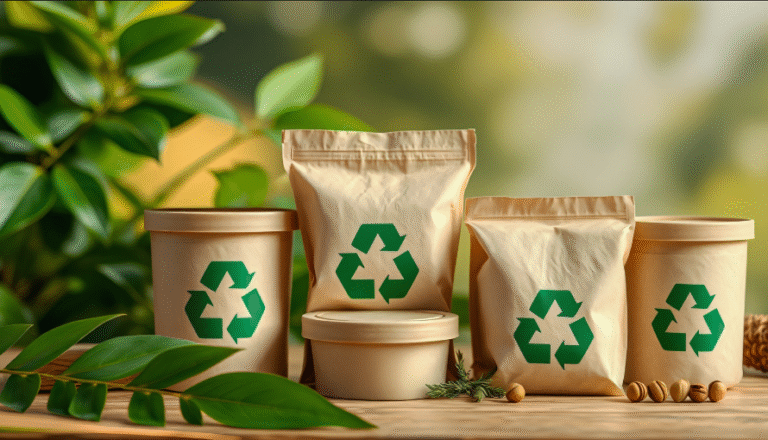Introduction
As climate concerns rise and industries embrace circular economy models, sustainable materials have emerged as a critical solution for environmental transformation. Sustainability is no longer optional — it’s urgent. One of the most impactful ways to reduce environmental harm is by rethinking the sustainable materials used in consumer goods and green construction. According to the World Economic Forum, sustainable materials play a central role in accelerating the green transition and enabling climate-positive innovation.
Here are five powerful, emerging sustainable materials transforming the way we build, design, and innovate in both consumer and construction industries:
1. Cork — Lightweight, Waterproof & Regeneratively Harvested
Cork is harvested from the bark of cork oak trees without harming the tree. It’s renewable, carbon-negative, and harvested every 9–12 years — making it a regenerative material with strong eco-credentials.
Why It Matters
- Regenerative Resource: The bark regrows naturally without cutting down the tree
- Carbon Sequestration: Cork trees absorb more CO₂ after harvesting
- Natural Insulation: Fireproof, waterproof, and sound-resistant
Applications
- Flooring and wall coverings for eco-conscious interiors
- Footwear, wallets, yoga mats, and fashion accessories
- Thermal and acoustic insulation in green construction
2. Bamboo — The Fastest-Growing Renewable Material
Bamboo is technically a grass, not a tree — and that distinction makes it one of the most renewable and fast-growing materials on Earth. It requires no pesticides, grows rapidly, and regenerates after harvesting.
Why It Matters
- Rapid Growth: Some species grow up to 3 feet per day
- Pest-Free: Requires no chemical treatments or fertilizers
- Carbon Efficient: Absorbs more CO₂ than most hardwood trees
Applications
- Furniture, flooring, and structural elements
- Kitchenware, toothbrushes, cutlery, and textiles
- Sustainable fashion fabrics like bamboo viscose and lyocell
3. Coir — Coconut Waste Turned Into Functional Fiber
Coir, derived from coconut husks, is a smart reuse of agricultural waste. Durable, biodegradable, and salt-resistant, coir is gaining popularity in eco-friendly product design and green construction.
Why It Matters
- Waste Utilization: Repurposes coconut waste into high-value materials
- Durability: Moisture- and salt-resistant; ideal for tough environments
- Eco-Friendly: Fully biodegradable and non-toxic
Applications
- Coir boards for insulation and building materials
- Mattresses, ropes, mats, and cushions
- Plant pots, erosion control, and biodegradable packaging
4. Mycelium — Nature’s Fungal Fabric for Design & Construction
Mycelium is the dense, root-like network of fungi. Cultivated in controlled conditions, it can be grown into strong, lightweight forms that rival plastic, leather, and even concrete substitutes — all while being biodegradable and compostable.
Why It Matters
- Rapid Growth: Can be grown in just 5–7 days using agricultural waste
- Biodegradable: Breaks down fully without leaving microplastics
- Versatile Engineering: Customizable strength, texture, and shape
Applications
- Packaging as a sustainable alternative to Styrofoam
- Acoustic and thermal insulation panels
- Furniture, handbags, footwear, and accessories
- Bio-architecture: tiles, walls, and structural elements
5. Hemp — The Industrial Super Crop
Hemp is a high-yield, multi-use plant known for its ancient heritage and future-forward potential. It’s grown with minimal water and no pesticides, and every part of the plant is usable — from stalks to seeds.
Why It Matters
- High Yield: Produces more fiber per acre than cotton or flax
- Carbon Storage: Efficient at CO₂ absorption
- Soil Regeneration: Detoxifies and replenishes the soil
Applications
- Hempcrete: a sustainable alternative to concrete
- Clothing, industrial textiles, bioplastics, and bags
- Animal bedding, ropes, paper, and compostable products
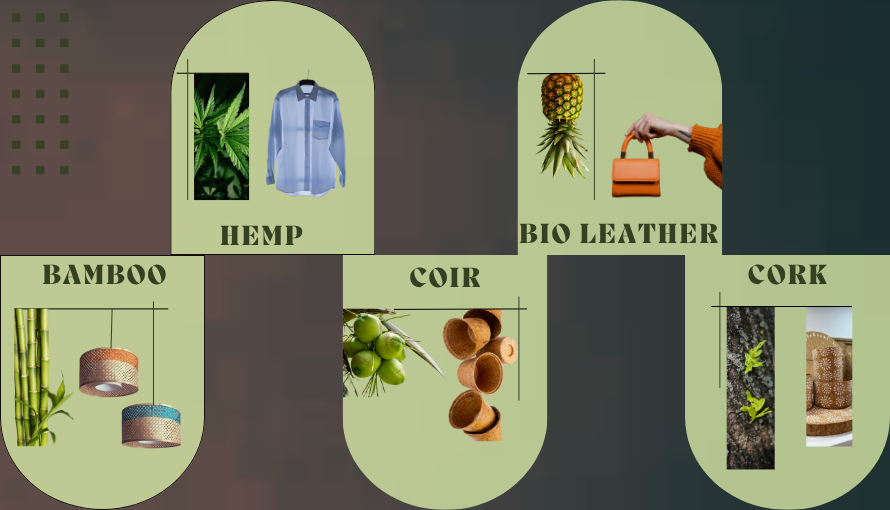
Conclusion: Reimagining Material Innovation for a Greener Planet
These five sustainable materials — Cork, Bamboo, Coir, Mycelium, and Hemp — reflect a critical shift toward circular design, conscious sourcing, and innovative applications. Whether you’re a manufacturer, brand, or designer, integrating sustainable materials into your product strategy can significantly reduce your environmental impact while unlocking performance and brand value.
Terranore supports companies in adopting sustainable materials and eco-design practices to future-proof their business.
Whether you’re a manufacturer, brand, or designer, exploring these eco-materials can future-proof your products and business while supporting a regenerative economy. At Terranore, we also offer tailored support for eco-friendly material innovation to help you transition from idea to sustainable execution.

